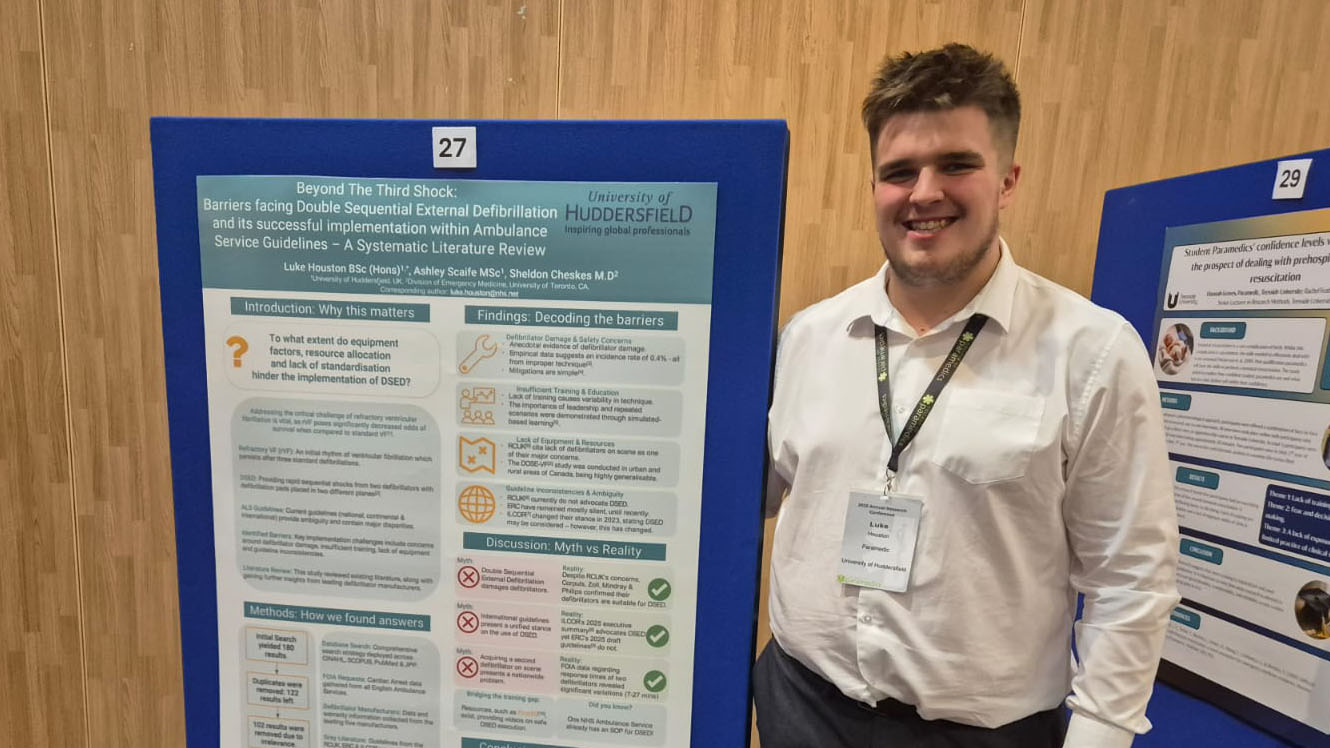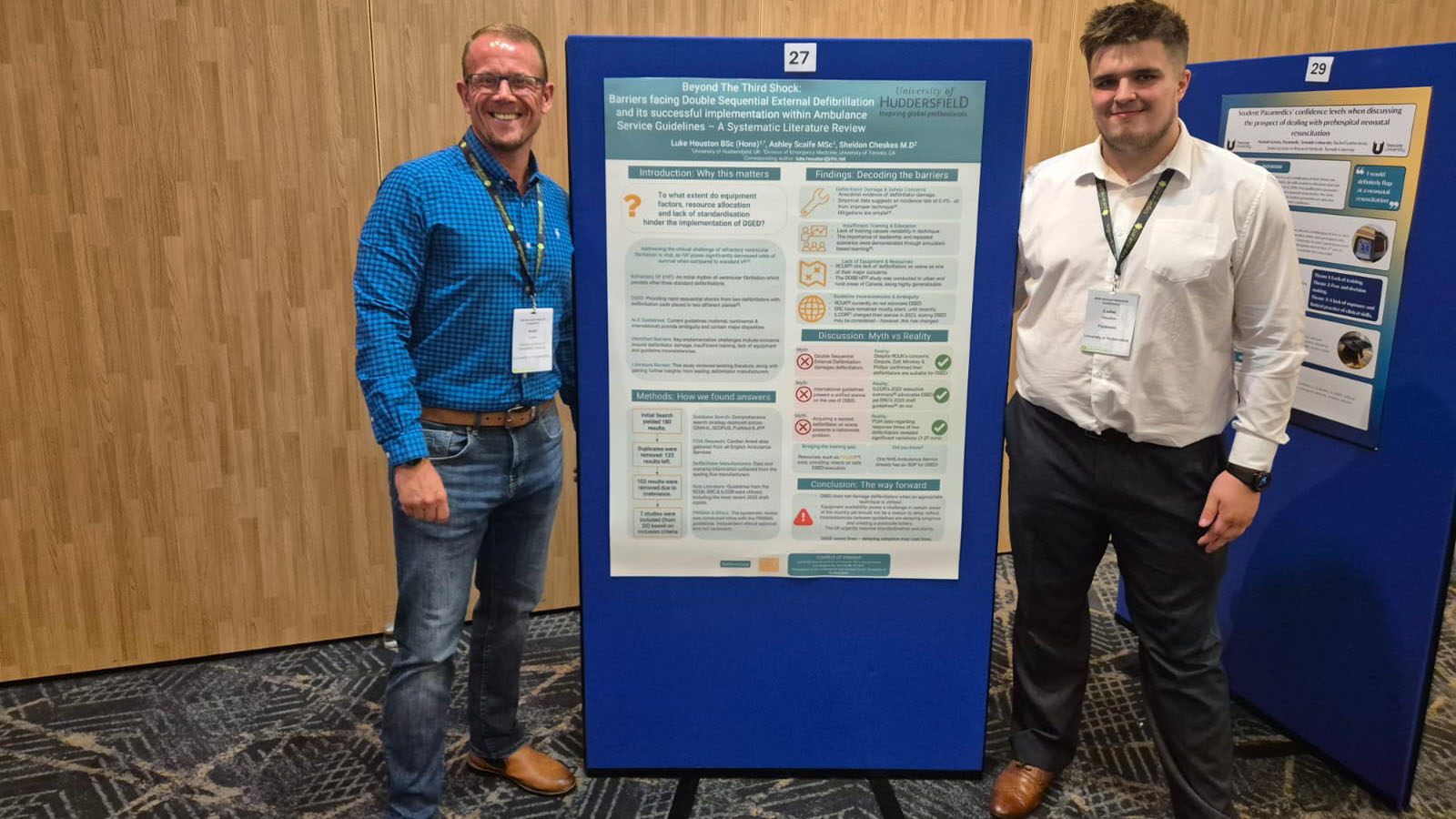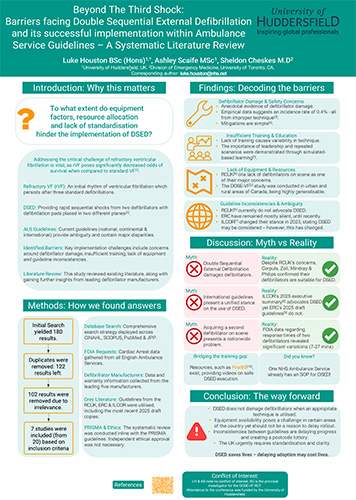Luke's research points to UK defibrillation survival prospects improvement

Huddersfield Paramedic Science graduate Luke Houston is hoping his research may lead to a technique for resuscitating cardiac arrest patients, that is used overseas, being adopted in the UK.
Luke, who graduated in July, looked into Double Sequential External Defibrillation (DSED) for his final year project. This process is where two defibrillators give a patient two shocks in very quick succession rather than the standard one shock.
He contacted Dr Sheldon Cheskes, a highly regarded Canadian academic who has written extensively on many forms of resuscitation, specifically including DSED. Dr Cheskes is the principal investigator of the landmark DOSEVF trial, which was published in the New England Journal of Medicine in 2022. Luke then presented his findings from a literature review at the College of Paramedics’ recent annual research conference in Birmingham with input from Dr Cheskes and tutor Ashley Scaife.
Study Paramedic Science at the University of Huddersfield
“The idea sprang from me listening to a podcast, by the Resus Room, around the time that I needed to decide what I was doing for my final-year project,” says Luke.
“I thought it was really interesting, and after reading Dr Cheskes’ original study I was puzzled why we were not doing this in the UK while it was standard practice in other parts of the world. It felt like we were a little behind.”
Dr Cheskes was only too happy to help Luke, as were multiple other health care professionals, including pre-hospital care air ambulance consultant doctors and critical care paramedics.
“I reached out to Dr Cheskes and he was incredibly helpful,” Luke adds. “We had a lot of meetings, a lot of emails flew back and forth, and he was very receptive to what I was doing. He has 30 years of experience as a doctor in emergency medicine and he wants to help the next generation.
“Initially my approach was does DSED work or not work? But a lot of the leg work had been done in the Canadian study so instead I looked into why it’s not done in the UK so much.

“I also spoke to experienced paramedics with the Yorkshire Ambulance Service (YAS) to gauge their opinions and looked at what the Resuscitation Council UK had to say. Because I was getting so many different answers and opinions, I had the idea to carry out a literature review.”
Luke’s research also busted a myth that DSED can damage defibrillators after he contacted several leading manufacturers.
“Four out of five - Corpuls, Zoll, Mindray and Philips – said they would be more than happy for the UK to use DSED, they could not understand why we are not already. It might be that we are not providing the best care that we could, despite the efforts of all the paramedics doing amazing work in very trying circumstances.”

Luke, originally from Manchester, is now waiting to start his first post-graduate role with YAS but is delighted with where his original curiosity has taken him.
“The idea of using two defibrillators seemed quite cool, but this research has spiralled into something I could never have predicted.
“I would like to express my sincere gratitude to Sakina Waller, one of my tutors at the university, whose support and guidance during the initial stages of this project were invaluable. Her insight helped lay the foundations for the work that followed.
"I am especially thankful to Ash, who supervised the project over the following six months and played a crucial role in shaping every aspect of the review. I am also deeply grateful to Sheldon for his ongoing mentorship and support throughout. Their combined expertise and encouragement have been instrumental, and I am honoured to have Ash and Sheldon as co-authors on this publication.”